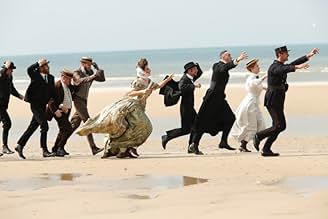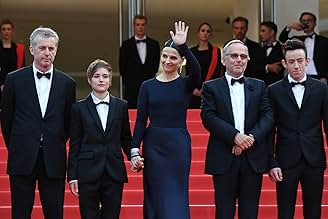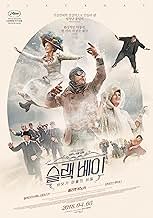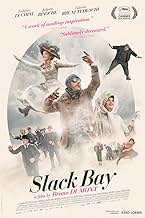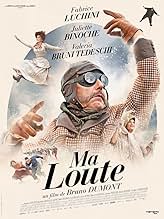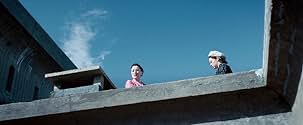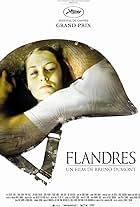In the early 20th century, at the Pas de Calais, people mysteriously disappear as Ma Loute, son of the local fishermen family, and Billie, daughter of the snobbish Van Peteghems, fall in lov... Read allIn the early 20th century, at the Pas de Calais, people mysteriously disappear as Ma Loute, son of the local fishermen family, and Billie, daughter of the snobbish Van Peteghems, fall in love each other.In the early 20th century, at the Pas de Calais, people mysteriously disappear as Ma Loute, son of the local fishermen family, and Billie, daughter of the snobbish Van Peteghems, fall in love each other.
- Awards
- 5 wins & 17 nominations total
Featured reviews
Only French can do a movie like this !
Cast is brilliant !
It's a dark comedy, quite absurd and... very different !
The locations are a magnificent part of France !
Cast is brilliant !
It's a dark comedy, quite absurd and... very different !
The locations are a magnificent part of France !
I just saw it in a festival and a several ladies left before the end. Me, i laughed a lot until tears come to my eyes. You need to really enjoy bizarre movies to like this one. This movie is unusual, funny, rare; the characters are dorky, exaggerated, histrionic, endearing. I can't tell too much without spoilers, but if you like peculiar movies with weird sense of humor, this movie is perfect. Its in the same line of Toni Erdmann but... a little weirder. And Juliette Binoche is awesome here. I loved it but again, it is not for people who don't like stranger things. And I need to complete the ten-lines-review, so I want to say, one more time, if you like weird movies, go for it!
It's a surreal macabre comedy, populated mostly by nasty cartoons, many of them are simply grotesque. While Bruno Dumont, the writer director of this film does tell us a very clear story, namely we all will understand what did actually take place on this bay, he never bothers explaining the reasons for the bizarre behavior of his cartoon characters. So we get an unsolveable mystery filled with mean caricatures of the uppermost bourgeoisie and of the police. He does get some of the best actors and actresses in France hamming their way through this weird story. And I would've rated it higher if I thought there was a reason behind this folly. One thing is sure, even if Dumont has some bizarre reasoning for this story - he doesn't want to reveal it to his audience.
One more issue I have to refer to: the name of this film. In English its Slack Bay, which alludes to the bay and to the nature of its residences. In Hebrew it became Disappearance Bay alluding to the mystery taking place there. The French name, that probably is the original is Ma Loute, the name of one of the main characters of this movie. Each name signifies different intentions, and I can't see why the original French name wasn't kept. You don't really have to translate a name.
One more issue I have to refer to: the name of this film. In English its Slack Bay, which alludes to the bay and to the nature of its residences. In Hebrew it became Disappearance Bay alluding to the mystery taking place there. The French name, that probably is the original is Ma Loute, the name of one of the main characters of this movie. Each name signifies different intentions, and I can't see why the original French name wasn't kept. You don't really have to translate a name.
Bruno Dumont made a Bruno Dumont film in his original region with real inhabitants. Like Li'l Quinquin, some actors are amateurs, some are pros, sadly...
There is no real plot here, no story. Just some days in the North of the France in the 1910's. There are some poetry, comedy, but all of the film is made by the situation of the actors, amateur or pro. The professional are to overdo : Binoche and Luchini are sometimes good, often to much, and so bad... The amateurs voices are always hard to understand, even if your are french. Maybe with the subtitle will be better.
I like this film, the photo are not so good (first film for the director in digital) the colors are usually blurry. There is no real story, the actors are inaudible or to overdo, it's hard to understand, the end are (for me ) not good... But ... i like it ! It's funny, shabby, unhealthy, beautiful, full of love, with no mockery. The director like is region, the people from there (like the Redneck in the USA) and made fun with their reputations. It's a little jewel of burlesque, like a Belgian film.
It's a unusual film, don't except a traditional thing. Take It As It Comes.
There is no real plot here, no story. Just some days in the North of the France in the 1910's. There are some poetry, comedy, but all of the film is made by the situation of the actors, amateur or pro. The professional are to overdo : Binoche and Luchini are sometimes good, often to much, and so bad... The amateurs voices are always hard to understand, even if your are french. Maybe with the subtitle will be better.
I like this film, the photo are not so good (first film for the director in digital) the colors are usually blurry. There is no real story, the actors are inaudible or to overdo, it's hard to understand, the end are (for me ) not good... But ... i like it ! It's funny, shabby, unhealthy, beautiful, full of love, with no mockery. The director like is region, the people from there (like the Redneck in the USA) and made fun with their reputations. It's a little jewel of burlesque, like a Belgian film.
It's a unusual film, don't except a traditional thing. Take It As It Comes.
The centennial anniversary of the breaking of WWI was an opportunity for several books to be written and films to be made (most of them documentaries) not only about the war itself, but also about the years that preceded it. Those were the finals years of a period that had started at the end of the Franco – Prussian war in 1870 and had seen a period of more than four decades of peace, never encountered in the written history of Europe. For many people living it those times La Belle Epoque seemed to signal an apparent stability based on the balance between the power of a few Empires and Republics. A middle class appeared in Europe allowing for economic development, arts flourished, and life was good for many. Yet, the political tensions were present at the level of the relations between the big powers in Europe, and many of the national societies were sick. Which is exactly the theme of Bruno Dumont's film 'Ma Loute'.
Dumont is one of the masters of a cinema sub-genre which I will call 'films about degenerated people' (or social, or family relations, or a combination of these. Marc Caro and Jean-Pierre Jeunet 's Delicatessen is another example of the genre, so is Dogtooth by Greek director Yorgos Lanthimos. 'Ma Loute' not only takes the genre one step ahead because of the quality of the execution, but also provides political and historical dimensions by locating the story of mysterious disappearances, social conflict between the rich tourists and the poor fishermen and a love story which is impossible for many reasons in a precise place – the North-West of France close to Calais and time – the end of La Belle Epoque.
Viewers should be warned that this is no easy film to watch. 5% of the audience walked out the theater I was in. Among those who stayed I suspect that half disliked what they have seen, with the negative reactions between considering the theme disgusting to ridiculous. The acting style is also very heavily and intentionally exaggerated. It is the description of sick families, of hateful relations between classes, of a non-functional society at all levels. The fact that all these seem to get some rational explanation may satisfy for a moment, but then the film slides in a combination of grotesque and fantastic (the levitation scenes) that is close to genial. Watching fine actors as Fabrice Luchini, Juliette Binoche,or Valeria Bruni Tedeschi is of course a delight but do not expect them to act like in any other movies that you have seen with them in the past. The young couple acted by Brandon Lavieville and Raph both at their first film add some level of innocence, but all is under the sign of the deformed mirrors here.
'Ma Louche' is a very different kind of cinema experience, viewers take risks watching it, and they are rewarded with a surprise which according to taste and approach can be very good or very unpleasant.
Dumont is one of the masters of a cinema sub-genre which I will call 'films about degenerated people' (or social, or family relations, or a combination of these. Marc Caro and Jean-Pierre Jeunet 's Delicatessen is another example of the genre, so is Dogtooth by Greek director Yorgos Lanthimos. 'Ma Loute' not only takes the genre one step ahead because of the quality of the execution, but also provides political and historical dimensions by locating the story of mysterious disappearances, social conflict between the rich tourists and the poor fishermen and a love story which is impossible for many reasons in a precise place – the North-West of France close to Calais and time – the end of La Belle Epoque.
Viewers should be warned that this is no easy film to watch. 5% of the audience walked out the theater I was in. Among those who stayed I suspect that half disliked what they have seen, with the negative reactions between considering the theme disgusting to ridiculous. The acting style is also very heavily and intentionally exaggerated. It is the description of sick families, of hateful relations between classes, of a non-functional society at all levels. The fact that all these seem to get some rational explanation may satisfy for a moment, but then the film slides in a combination of grotesque and fantastic (the levitation scenes) that is close to genial. Watching fine actors as Fabrice Luchini, Juliette Binoche,or Valeria Bruni Tedeschi is of course a delight but do not expect them to act like in any other movies that you have seen with them in the past. The young couple acted by Brandon Lavieville and Raph both at their first film add some level of innocence, but all is under the sign of the deformed mirrors here.
'Ma Louche' is a very different kind of cinema experience, viewers take risks watching it, and they are rewarded with a surprise which according to taste and approach can be very good or very unpleasant.
Storyline
Did you know
- TriviaThe second of Bruno Dumont's films to employ some professional actors rather than only amateurs after Camille Claudel 1915 (2013), which already starred Juliette Binoche.
- ConnectionsReferenced in Conversations avec... (2018)
- SoundtracksBARBERINE: PRELUDE AU 2ème ACTE
Composed by Guillaume Lekeu
Performed by Orchestre Philharmonique de Liège
© Domaine Public
(p) Ricercar / Outhere Music
- How long is Slack Bay?Powered by Alexa
Details
- Release date
- Countries of origin
- Official sites
- Languages
- Also known as
- La bahía
- Filming locations
- Wissant, Pas-de-Calais, France(Egyptian villa)
- Production companies
- See more company credits at IMDbPro
Box office
- Budget
- €7,209,690 (estimated)
- Gross US & Canada
- $112,621
- Gross worldwide
- $4,925,446
- Runtime2 hours 2 minutes
- Color
- Aspect ratio
- 2.35 : 1
Contribute to this page
Suggest an edit or add missing content


![Watch Bande-Annonce [VO]](https://m.media-amazon.com/images/M/MV5BMmRjYmFlNjUtMzE4Mi00ZjM5LTgyYzItNTQ0OWFlNDNhZGNjXkEyXkFqcGdeQXRyYW5zY29kZS13b3JrZmxvdw@@._V1_QL75_UX500_CR0,0,500,281_.jpg)

